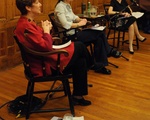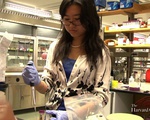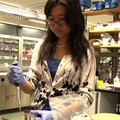Science
EPA Grants Go to Harvard, MIT
Harvard and MIT researchers received $2.1 million in grants from the U.S. Environmental Protection Agency last Thursday to study the effects of climate change on public health and local ecosystems.
Risk Factors Affect Life Expectancy Disparities, HSPH Researchers Say
Life expectancy disparities among people of different socio-economic, geographic, and racial backgrounds can be explained by different modifiable habits and health issues, researchers at the Harvard School of Public Health reported last month.
Harvard To Institute Research Ethics Training
Harvard has instituted a new policy that requires all science students conducting research to receive ethics training, University officials say.
Lab Rat of the Week: Vijay Jain '11
Vijay Jain ’11 has found a medium in which he can combine his two loves, chemistry and physics.
SEAS Profs Heat Up Science Courses
Several professors at Harvard’s School of Engineering and Applied Sciences have taken a novel approach to teaching physics—cooking in class.
Science and Music
Physicist Lisa Randall and science journalist Marcia Bartusiak spoke at the First Parish Church about how creativity bridges the gap between scientific theories and artistic expressions.
Harvard Overseer Launches into Space
Stephanie D. Wilson ’88, a member of the Harvard Board of Overseers, launched into space for the third time yesterday ...
MIT Professor Honored As Scientist of the Year
MIT Professor Paula T. Hammond was honored as Scientist of the Year at the Harvard Foundation’s Albert Einstein Science Conference last Friday.
Star Nearly As Old As Universe Found
The discovery of a dwarf galaxy star nearly as old as the universe has provided a missing link in supporting the “cannibalistic” theory of galaxy formation, according to a study led by Harvard researcher Anna Frebel that was published in the journal “Nature” this month.
Lighting Up the Laboratory
Molecular and Cellular Biology concentrator Amy Guan ’12 is taking the research world by storm
Bacteria Patterns Aid Carbon Fixation
Harvard Medical School researchers have discovered that the organelles responsible for carbon fixation within cyanobacteria organize themselves in predictable patterns—a finding that could help researchers engineer more efficient designer bacteria.












